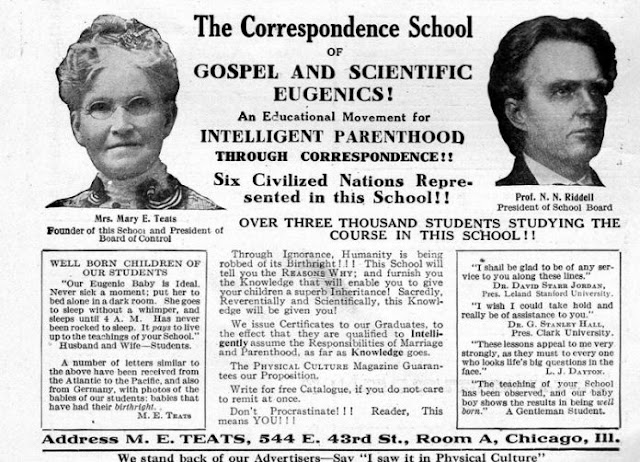 |
| Early 20th Century Newspaper Ad - Source: Leben |
By Wayne Johnson - Posted at Leben:
In the early years of the 20th Century, the “science” of eugenics spread across America, from pulpits to statehouses, with religious zeal. The underlying premise of the eugenics movement was that the undesirable traits of parents would invariably be passed on to their children. While the scientific basis for this assumption had little data to support its conclusions, the new “science” was quickly embraced by the American progressive movement and many of the wealthy.
Early funding for eugenics projects came from such well-heeled Americans as John Rockefeller, J.P. Morgan, and oil magnate and founder of the 3-in-1 Oil Company, James Noah H. Slee, the second husband of Planned Parenthood founder Margaret Sanger. The term eugenics was coined by Sir Francis Galton, a British anthropologist, progressive and scientist. The Galton family were prosperous Quakers who made their fortune in manufacturing guns.
A half-cousin of Charles Darwin, Galton saw the social implications of his cousin’s theories and developed the first early surveys to collect data on different population groups. That data was used to argue the case for aggressive social engineering to protect the vigor of the race. From the beginning, eugenics was aimed squarely at reducing or eliminating the less healthy or socially undesirable elements of society.
Eugenics found a ready audience in Germany, England and the United States, and led eventually to the founding of the American Eugenics Society. The AES was wildly successful in its efforts, resulting in more than half of the states adopting eugenics programs, often involving forced sterilization, and efforts to forbid some to marry or reproduce.
“In 1907, in an attempt to effect God’s will while resolving major social problems, the State of Indiana passed the first sterilization law in the United States. Other states of the nation were not far behind Indiana in approving sterilization legislation and, while California eventually became the nation’s leader in the campaign to sterilize the unfit, by mid-century some sixty thousand Americans had been deemed unfit or too dangerous to be a part of the nation’s gene pool and had been sterilized (pp. 47—8). This was accomplished with the specific approval of the Supreme Court of the United States which ruled, in a decision written by Justice Oliver Wendell Holmes, Jr.—Buck v. Bell (1927)—that states had a legal right to sterilize their citizens (pp. 151–2).”1
It dovetailed nicely with the “heaven on earth” theology then popular among liberal clergy, who had contests for the best pro-eugenics sermons. These sermons were then circulated to other preachers to be recited in pulpits across America.
The Right Reverend E.W. Barnes, Bishop of Birmingham put it this way in Some Reflections on Eugenics and Religion,2 where he pictures God as something of a divine gardener, using the harshness of nature to weed out the undesirable.
“The thought that God acts in this way is often disliked and ignored by those who wish to retain a belief in ethical Theism. They recoil from the idea that He permits degeneration as well as progress to take place. Their distress would be less acute if they remembered that environment is equally His creation. However perplexed we may be by the whole scheme, the fact remains that it has led to the successive emergence of more highly organized animal types culminating in man. And moreover, in man there has been, owing to this process, a growth of moral excellence and spiritual understanding. By spiritual un-derstanding, I mean man’s knowledge that the obligation of truth and goodness are imposed upon him from without by the very nature of things: that we ought to be loyal to absolute standards outside ourselves; that there are in the universe absolute standards that transcend space and will out last time. Man by acquiring such understanding has begun to enter the Kingdom of the good, the beautiful and the true.”Read more here.